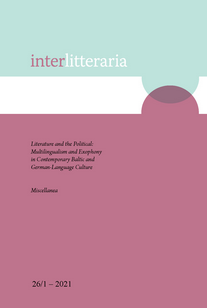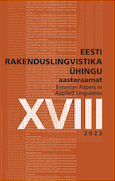Author(s): Mare Kitsnik,Sille Midt / Language(s): Estonian
Issue: 18/2022
Understanding the role of language errors and skillfully dealing with them is an important factor influencing the effectiveness of second language learning. The article focuses on teachers’ attitudes towards their 7th–9th grade pupils’ errors and how they address their errors. The results were obtained via an online questionnaire among teachers at different schools (n = 25), the results of which were analyzed quantitatively and qualitatively and compared with the principles of the usage-based approach (Martin et al. 2010, Eskildsen 2008, Mustonen 2015). In conclusion, teachers’ opinions are partly consistent with the usage-based approach. According to the teachers, their students make a lot of errors, and the most common type of errors are morphosyntactic. Teachers generally consider errors in the process of linguistic development to be natural, but they also think that errors need to be addressed. Concerning the feedback types, it was found that for dealing with errors in oral texts, a wider range of feedback types was perceived as useful than for written texts. In the written text, most teachers correct all errors, in the oral text, not all errors are corrected. When correcting errors in both oral and written texts, most respondents take into account the student’s language proficiency level and the type of task. In the oral texts teachers also take into account the recurrence of the error and the student’s personality, and in the case of written texts, previous learning of the subject. Errors in oral text are usually corrected after speaking, and more explicit learning is valued, which requires students to pay close attention to the errors and to correct the errors themselves. When correcting errors in a written text, teachers rather present the correct structures with explanations themselves. Teachers value the role of speaking in the development of linguistic accuracy and also allow learners to use language with errors. Repeated teaching of error-prone topics is also considered important to reduce errors. However, practice, especially oral practice of error-prone topics, is not seen as important. The impact of listening to authentic input on the development of linguistic accuracy is also underestimated, and the role of writing is rather underestimated. The study only reflects teachers’ self-esteem in terms of correcting errors, which does not mean that teachers behave exactly according to their opinions in the actual teaching process. It is also not clear from the study how good the teachers’ knowledge is of the errors characteristic in different stages of development. In the future, it would be worthwhile to study the same topic with lesson observations. It would also be worthwhile to differentiate between groups of teachers who have different views on errors. Despite some limitations, the results of the study provide important information in a hitherto unexplored area. The results should be taken into account in teacher training and the creation of methodological materials.
More...


